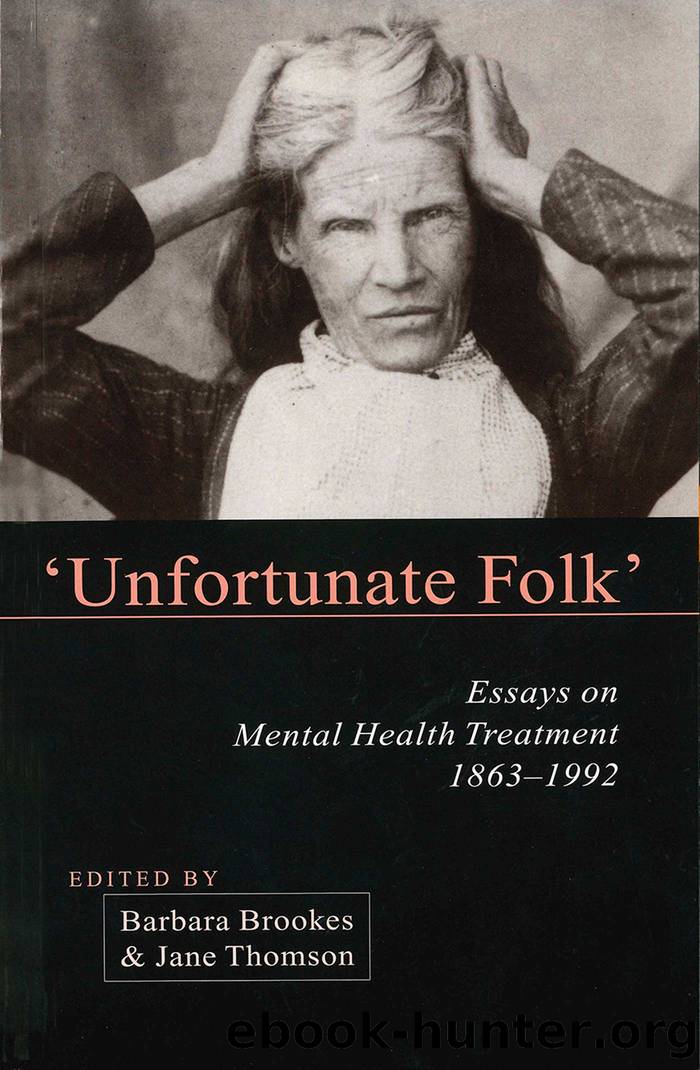Unfortunate Folk by Barbara Brookes

Author:Barbara Brookes
Language: eng
Format: epub
Publisher: Otago University Press
Unmanageable masculinity
Menâs experience of madness, like womenâs, was influenced by social expectations of their gender roles. The traditional stereotype of the strong, independent, and assertive male began in New Zealandâs pioneer days and became part of the national ethos. Men outnumbered women in the population until after this period, and a significant number never married. The feminine and the intellectual were often rigorously eschewed and physical values were glorified. On the battlefields of South Africa in the Boer War, and on the rugby fields of Britain in 1905, New Zealand men proved to the world that they were âinvincibleâ. They emerged from the First World War with this image not only intact but embellished. Over 50 per cent of those conscripted to fight for their king and country were rejected by the armyâs doctors, primarily for heart disease, suggesting that they were not always hardy and virile âblokesâ, but the reality of physical weakness hardly tarnished the popular perception of âour boysâ.52 Moreover, that cornerstone of male culture, the âpubâ, weathered the attacks of the Prohibitionists and emerged from the Great War as a male enclave. Six oâclock closing reinforced this. The pub became a refuge from the burdens and responsibilities of the outside world, where men might relive the frontier experience of men together but alone.53
At the same time, the flourishing ideology of motherhood necessarily influenced the lives of New Zealandâs men. Women could not attain true womanhood as wives and mothers without men as husbands and fathers. As well as being as rugby players, drinkers and workers, more and more men were expected to be economic providers and respectable family men in an increasingly urban society. In the Depression years this became difficult. In 1928-29, 4718 cases of involuntary unemployment were recorded in New Zealand; three years later that figure had risen to 28,773.54 Many menâs identity was threatened by lack of work, economic hardship and reliance upon the charity of others. The possibility of being the independent âman aloneâ was increasingly elusive in reality, and so was the possibility of being a good provider. The study of the files of men committed to Seacliff Mental Hospital from 1928 to 1937 suggest that many failed to cope with the pressures of trying to fulfil the conflicting expectations of the male gender role. Many sought reassurance by reasserting the physical values which had made them men in the past. Indigence, unemployment and loneliness could mean physical prowess turned to violence, drinking turned to alcoholism, and low self-esteem produced delusions.
As with women, most male patients (over two-thirds) were committed by their families. Violent behaviour was often the reason. Robert T was suffering from general paralysis of the insane, the tertiary stage of syphilis, but it was his abusive behaviour at home which prompted his committal. His wife stated that he had caught her by the throat and punched her, and he admitted that he was apt to âgo crookâ when his word was questioned.55
Thirty-two year-old Frank L had threatened to
Download
This site does not store any files on its server. We only index and link to content provided by other sites. Please contact the content providers to delete copyright contents if any and email us, we'll remove relevant links or contents immediately.
Spare by Prince Harry The Duke of Sussex(5186)
Machine Learning at Scale with H2O by Gregory Keys | David Whiting(4301)
Fairy Tale by Stephen King(3378)
Will by Will Smith(2916)
The Bullet Journal Method by Ryder Carroll(2564)
Hooked: A Dark, Contemporary Romance (Never After Series) by Emily McIntire(2552)
Rationality by Steven Pinker(2356)
It Starts With Us (It Ends with Us #2) by Colleen Hoover(2354)
Can't Hurt Me: Master Your Mind and Defy the Odds - Clean Edition by David Goggins(2328)
Friends, Lovers, and the Big Terrible Thing by Matthew Perry(2223)
The Becoming by Nora Roberts(2191)
Love on the Brain by Ali Hazelwood(2063)
A Short History of War by Jeremy Black(1844)
The Strength In Our Scars by Bianca Sparacino(1842)
HBR's 10 Must Reads 2022 by Harvard Business Review(1841)
Leviathan Falls (The Expanse Book 9) by James S. A. Corey(1730)
A Game of Thrones (The Illustrated Edition) by George R. R. Martin(1730)
515945210 by Unknown(1664)
Bewilderment by Richard Powers(1609)
